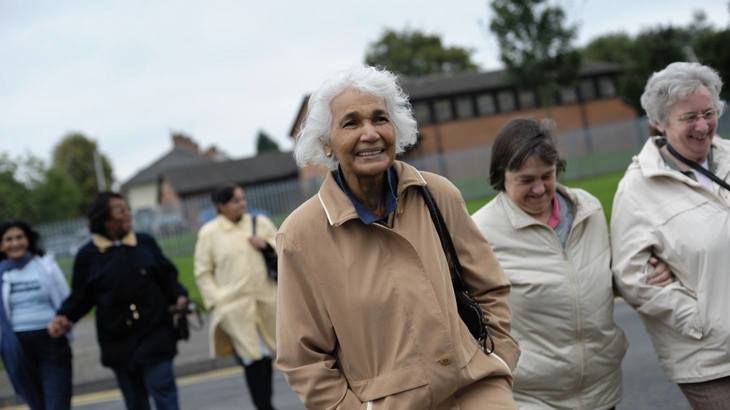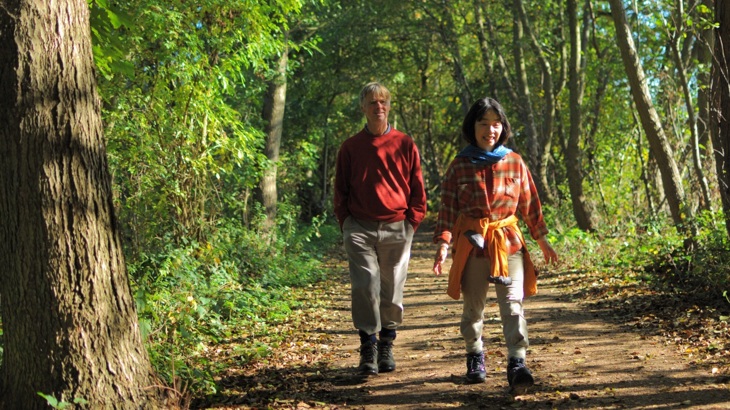Walking is an easy and accessible form of exercise, whatever age you are. We caught up with Active Ageing, a Bristol-based project getting older people moving, to speak about the benefits of walking and how you can fit it into your everyday life.

Walking can help you build stamina, burn excess calories and make your heart healthier.
You don't need a gym membership or expensive equipment to walk.
It's a flexible and adaptable form of exercise that you can shape to suit your lifestyle.
You can fit walking around your schedule or head out for a stroll on a whim.
It's free to do and has many health benefits.
Even a 15-minute wander to the shops can benefit your physical and mental wellbeing.
If you find it difficult to exercise and be active, adding walking to your daily routine is a fantastic way to get moving.
The benefits of walking
We're often told about the benefits of vigorous aerobic activities like running and cycling.
There's no doubting that these exercises are good for you, but they can also be challenging as you age.
It’s often overlooked as a form of exercise, but a brisk walk has been proven to help your body in more ways than one.
Speaking about the benefits of walking, Karen Lloyd, Active Ageing Bristol Manager, said:
“Walking is simple, free and one of the easiest ways to get more active, lose weight and become healthier and happier.
“It can help you build stamina, burn excess calories and make your heart healthier.”
How to start walking
It’s recommended that adults over the age of 65 aim for 150 minutes of exercise a week, and walking is an easy and manageable way of achieving this target.
The best thing about walking is that it's accessible and it’s free.
It doesn't have to be a challenge and doesn't need much preparation.
All you need is comfortable clothes, a pair of suitable shoes and a willingness to get going.
Take it easy
If you are new to being active, take it easy and do what works for you.
That said, you should aim for a brisk tempo and don’t fall into a stroll.
One way to tell if you're exercising at a moderate level is if you can still talk but can't sing the words to a song.
However, if that’s not manageable, take it easy.
Short and brisk
You also don't need to go on long walks to enjoy the benefits of walking.
In fact, a few 15-minute walks a day may be more beneficial to your wellbeing than one long walk.
Sitting down and being sedentary for long periods of time is now considered to be a health risk, no matter how much exercise you do.
So, performing a few short walks a day to break up long periods of sedentary behaviour with light activity can have a huge impact on your overall health.

You also don't need to go on long walks to enjoy the benefits of walking. In fact, a few 15 minute walks a day may be more beneficial to your wellbeing than one long walk.
Make it routine
To help integrate walking into your daily life, think of it as a means of getting somewhere rather than just a form of exercise.
One way to do this is to make small changes to your routine and implement walking where possible.
Instead of driving to the shops or to a friend’s house, try and walk instead.
Try to use the stairs when possible and set yourself small goals to achieve over time.
If you struggle to walk the whole distance to the shops, you could initially drive part way and increase the walking distance over time.
Set goals
Setting goals will give you something to work towards, and being held responsible by someone else can have the same effect.
Getting a friend to walk with you or having a form of light-hearted competition between yourselves can give you the encouragement you need when you lose motivation.
Join a group
Similarly, there’s plenty of walking groups aimed at getting older people moving and socialising.
Figures show that over half (51%) of people aged 75 live alone and two-fifths of older people say the television is their main company.
Walking in a group can help tackle loneliness and get you healthier.
"Walking in a group is a great way to start walking, make new friends and stay motivated,” says Karen Lloyd.
“People join for all sorts of different reasons, but I have witnessed first-hand the benefits that these groups can have on people.
"People enjoy the sociability and the fact it brings together people from all walks of life. It's health-promoting and social.
"We’ve even had attendees who say the walking group has saved their mental health… calling it a lifeline.
"To find your nearest health walk group offering free, short, regular, led walks, visit the Walking For Health website and use the postcode search."
Please bear in mind current restrictions due to Covid-19.
One last thing
The idea of starting a new exercise regime can seem difficult, whatever age you are. But it doesn’t need to be.
Walking is a fantastic way to get active and improve your physical and mental wellbeing.
It doesn’t require any equipment and can be shaped around your needs and lifestyle.
If you’re unsure about your fitness levels, take it easy to begin with and build your stamina over time.
You should also speak to a medical professional if you’re concerned about the impact of being active on your health.
While it’s unlikely to be a problem, they may need to give you a few exercises to build up your strength gradually.





